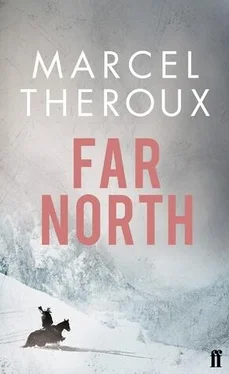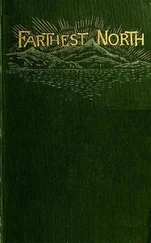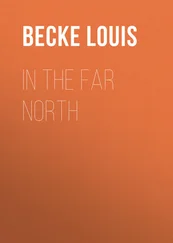EVERY DAY I BUCKLE on my guns and go out to patrol this dingy city.
I’ve been doing it so long that I’m shaped to it, like a hand that’s been carrying buckets in the cold.
The winters are the worst, struggling up out of a haunted sleep, fumbling for my boots in the dark. Summer is better. The place feels almost drunk on the endless light, and time skids by for a week or two. We don’t get much spring or fall to speak of. Up here, for ten months a year, the weather has teeth in it.
It’s always quiet now. The city is emptier than heaven. But before this, there were times so bad I was almost thankful for a clean killing between consenting adults.
Yes, somewhere along the ladder of years I lost the bright-eyed best of me.
Way back, in the days of my youth, there were fat and happy times. The year ran like an orderly clock. We’d plant out from the hothouses as soon as the earth was soft enough to dig. By June, we’d be sitting on the stoop podding broad ans until our shoulders ached. Then there were potatoes to dry, cabbages to bring in, meat to cure, mushrooms and berries to gather in the fall. And when the cold closed in on us, I’d go hunting and ice-fishing with my pa. We cooked omul and moose-meat over driftwood fires at the lake. We rode up the winter roads to buy fur clothes and caribou from the Tungus.
We had a school. We had a library where Miss Grenadine stamped books and read to us in winter by the wood-burning stove.
I can remember walking home after class across the fryingpan in the last mild days before the freeze, and the lighted windows sparkling like amber, and ransacking the trees for buttery horse chestnuts, and Charlo’s laughter tinkling up through the fog, as my broken branch went thwack! thwack! , and the chestnuts pattered around us on the grass.
The old meeting-house where we worshipped still stands on the far side of the town. We used to sit there in silence, listening to the spit and crackle of the logs.
The last time I went in there was five years ago. I hadn’t been inside for years, and when I was a child I’d hated every stubborn minute I’d been made to sit there.
It still smelled like it used to: well-seasoned timber, whitewash, pine needles. But the settles had all been broken up to be burned, and the windows were smashed. And in the corner of the room, I felt something go squish under the toe of my boot. It turned out to be someone’s fingers. There was no trace of the rest of him.
*
I live in the house I grew up in, with the well in the courtyard and my father’s workshop much as it was in my childhood, still taking up the low building next to the side gate.
In the best room of the house, which was kept special for Sundays, and visitors, and Christmas, stands my mother’s pianola, and on it a metronome, and their wedding photograph, and a big gilded wooden M that my father made when I was born.
As my parents’ first child, I bore the brunt of their new religious enthusiasm, hence the name, Makepeace. Charlo was born two years later, and Anna the year after that.
Makepeace. Can you imagine the teasing I put up with at school? And my parents’ displeasure when I used my fists to defend myself?
But that’s how I learned to love fighting.
I still run the pianola now and again, there’s a box of rolls that still work, but the tuning’s mostly gone. I haven’t got a good enough ear to fix it, or a bad enough one not to care that I can’t.
It’s almost worth more to me as firewood. Some winters I’ve looked at it longingly as I sat under a pile of blankets, teeth chattering in my head, snow piled up to the eaves, and thought to myself, damn it, take a hatchet to it Makepeace, and be warm again! But it’s a point of pride with me that I never have. Where will I get another pianola from? And just because I can’t tune the thing and don’t know anybody who can, that doesn’t mean that person doesn’t exist, or won’t be born one day. Our generation’s not big on reading or tuning pianolas. But our parents and their parents had plenty to be proud of. Just look at that thing if you don’t believe me: the burl on the maple veneer, and the workmanship on her brass pedals. The man who made that cared about what he was doing. He made that pianola with love. It’s not for me to burn it.
The books all belonged to my folks. Charlo and my ma were the big readers. Except for that bottom shelf. I brought those back here myself.
Usually when I come across books I take them to an old armoury on Delancey. It’s empty now, but there’s so much steel in the outer door, you’d need a keg of gunpowder to get to them without the key. As I said, I don’t read them myself, but it’s important to put them aside for someone who will. Maybe it’s written in one of them how to tune a pianola.
I found them like this: I was going down Mercer Street one morning. It was deep winter. Snow everywhere, but no wind, and the breath from the mare’s nostrils rising up like steam from a kettle. On a windless day, the snow damps the sound, and the silence everywhere is eerie. Just that crunch of hooves, and those little sighs of breath from the animal.
All on a sudden, there’s a crash, and a big armful of books flops into the snow from what must have been the last unbroken window on the entire street until that moment. The horse reared up at the sound. When I had her calm again, I looked up at the window, and what do you know, there’s a little figure hang-dropping into the books. He’s bundled up in a bulky blue one-piece and fur hat. Now he’s gathering up the books and fixing to leave.
I shouted out to him, ‘Hey! What are you doing? Leave those books, damn it! Can’t you find something goddamn else to burn?’, along with a few other choice expressions.
Then, just as quick as he appeared, he flung down his armful of books and reached to draw a gun.
Next thing there’s a pop, and the horse rears again and the whole street is more silent than before.
I dismounted easy does it with my gun drawn and smoking and go over to the body. I’m still a little high from the draw, but already I’m getting that heavy-hearted feeling and I know I won’t sleep tonight if he dies. I feel ashamed.
He’s lying still, but breathing very shallow. His hat came off as he fell. It lies in the snow a few steps away from him, among the books. He’s much smaller than he seemed a minute earlier. It turns out he’s a little Chinese boy. And instead of a gun, he was reaching for a dull Bowie knife on his hip that you’d struggle to cut cheese with.
Well done, Makepeace.
He comes to slightly, grunting with the pain, and tries to push me away from him. ‘Let me have a look at where you’re hit. I can help you. I’m the constable here.’ But his clothes are too thick for me to examine him, and it’s too dangerous to linger here, unarmed and dismounted, especially in daylight.
It’s not going to be comfortable, but the only thing for it is to move him. Better get the books as well, so the whole escapade hasn’t been fruitless. I toss them into a burlap sack. The boy weighs nothing. It’s heartbreaking. What is he? Fourteen? I lift him onto the saddle and he rides in front of me, drifting in and out of consciousness until we get back.
The good news is that he&squos still breathing. His arms reach feebly for my shoulders as I help him dismount. I know the pain is not so terrible for him yet. The body makes its own opium when it’s been hit. But in the middle of that feeling, there’s also a sensation of injustice. That you’ve broken something you don’t know how to fix. That you won’t be the same again.
Читать дальше












